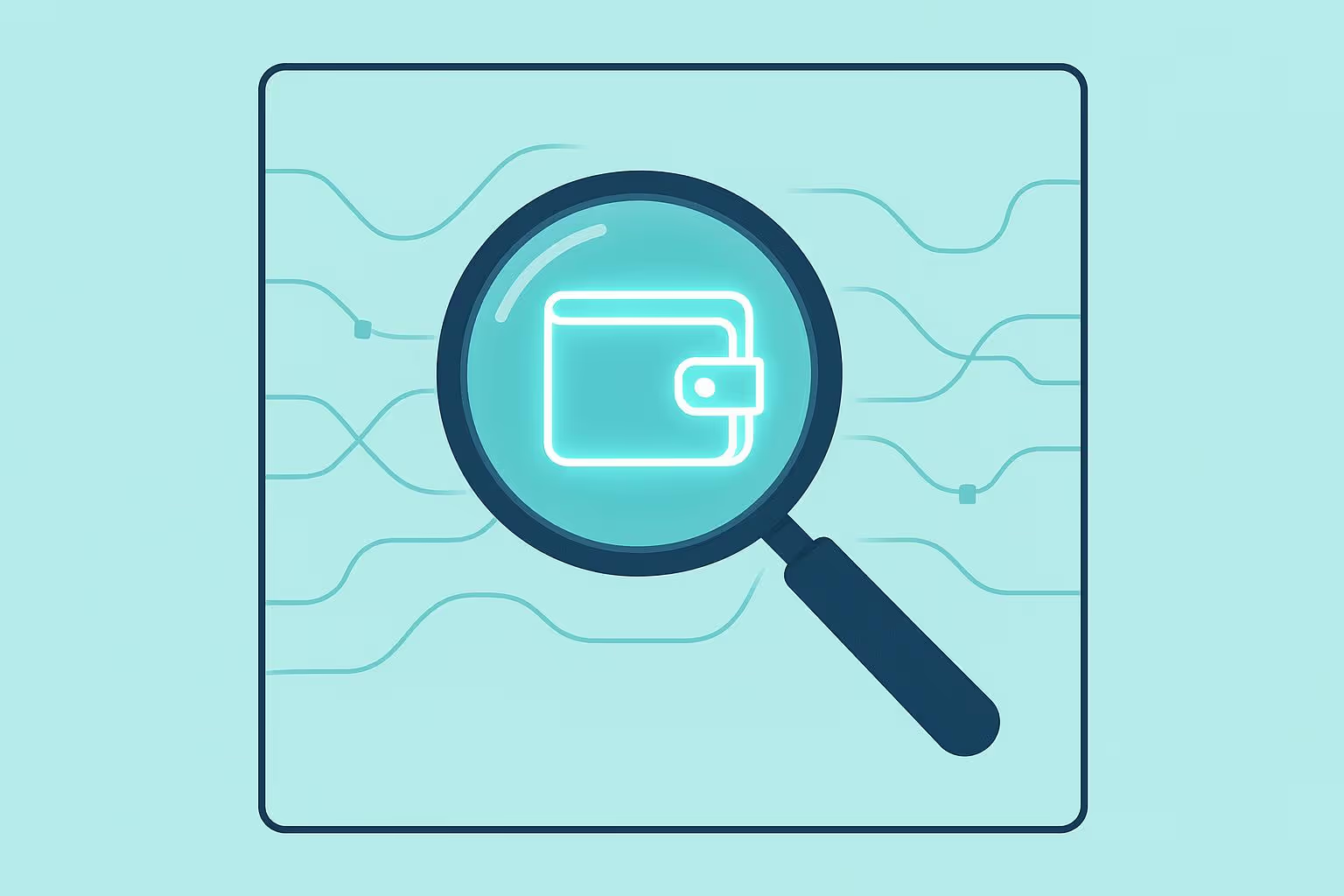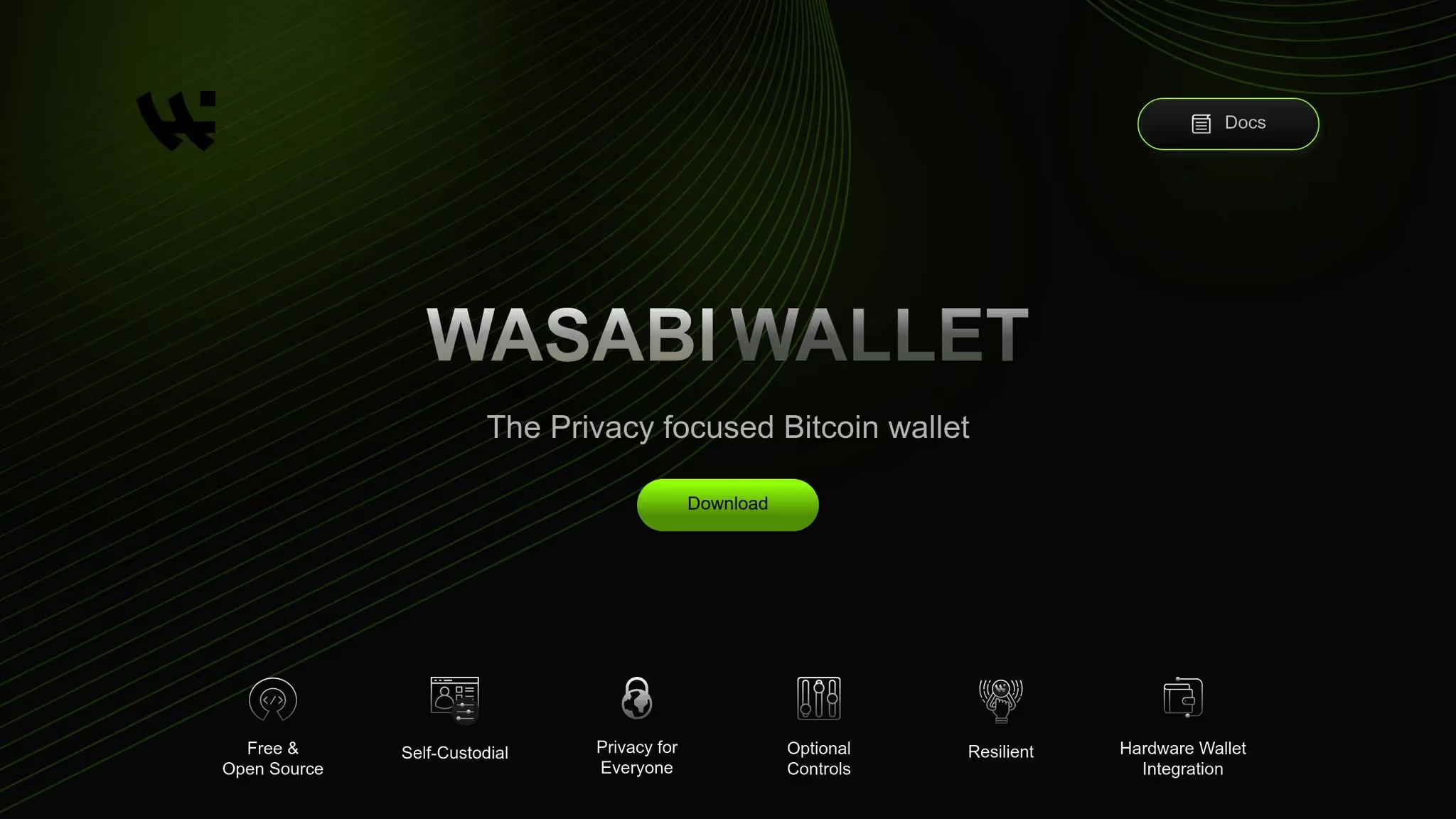Your Ultimate Guide to DeFi Wallet Apps
Discover how to choose the right DeFi wallet app. This guide covers features, security, and strategies to turn your wallet into a powerful trading tool.

February 8, 2026
Wallet Finder

November 7, 2025

The fastest way to track profitable wallets and trending tokens.
Anonymous wallets are key players in DeFi, often linked to traders generating returns of up to 340% and profits exceeding $100 million. By analyzing these wallets, you can identify token movements, trading strategies, and market trends before they happen. Tools like Wallet Finder.ai provide real-time alerts, performance metrics, and multi-chain insights to help you make informed decisions.
Encrypted, secure login
Ethereum, Solana, Base
PnL, alerts, token trends
API, CSV/Excel exports
Wasabi Wallet
CoinJoin, Tor integration
Bitcoin
Privacy-focused, limited analytics
Manual reporting
Electrum + Tails OS
Full system anonymization
Bitcoin
Manual transaction review
Command-line export
Best Wallet
Limited transparency
Multi-chain (claims)
Basic transaction tracking
Manual data extraction
CipherTrace
Enterprise-grade privacy
900+ cryptocurrencies
Compliance and investigative tools
Start your free trial with Wallet Finder.ai to stay ahead in DeFi.

Wallet Finder.ai is a powerful tool designed to track high-performing blockchain wallets and distill their trading strategies into actionable insights for traders.
Wallet Finder.ai provides a deep dive into wallet performance with metrics like realized PnL, win rates, and risk evaluations. By examining full wallet histories, users can uncover the trading strategies behind successful wallets, including entry and exit points, position sizes, and timing patterns.
The platform also offers real-time tracking with push notifications and Telegram alerts, notifying traders when whale wallets make significant moves. This feature can help users identify opportunities up to 48 hours before the market reacts.
Advanced filtering tools make it simple to pinpoint profitable wallets and trades. These filters work seamlessly with multi-chain data, giving traders a streamlined way to access critical insights.
Wallet Finder.ai supports cross-chain analytics for Ethereum, Solana, and Base ecosystems. Its Discover Tokens feature highlights trending tokens in real time, offering information on token concentration and essential security stats like contract ownership, blacklist status, honeypot risks, and proxy indicators.
This data isn’t just informative - it enhances trading strategies and helps users better manage risk.
Wallet Finder.ai is built to complement data-driven trading and risk management approaches. Users can export filtered blockchain data or complete datasets in formats like CSV or Excel for offline analysis.
The platform also allows traders to mirror the moves of DeFi’s top 1% performers in real time. Custom watchlists can be created to track specific wallets or strategies, enabling users to adapt these insights to their own portfolios. Additionally, traders can connect their own crypto wallets to monitor performance, review historical data, and identify trends for better decision-making.
With a 4.9-star rating from user reviews, Wallet Finder.ai offers a 7-day free trial. While the trial includes limited features and masked wallet addresses, it provides a chance to explore the platform’s potential before committing to a subscription.

Best Wallet is another option worth considering after WalletFinder.ai, though the available verified information about its capabilities is quite limited.
Details on how Best Wallet analyzes anonymous wallets are scarce. It claims to function as a multi-chain solution, but specifics about its privacy features, supported blockchains, asset tracking capabilities, or integration with trading and risk management tools remain unconfirmed. For the most accurate and updated information, it’s best to refer directly to Best Wallet’s official announcements. This lack of transparency underscores the critical need for reliable, verified data when incorporating wallet insights into algorithmic risk assessments.

Wasabi Wallet stands out by putting privacy above all else, focusing exclusively on secure and anonymous Bitcoin transactions rather than offering a wide range of performance tracking features.
The cornerstone of Wasabi Wallet's privacy approach is its use of the CoinJoin mixing protocol. This technique blends multiple Bitcoin transactions into a single transaction, effectively obscuring the connection between sender and receiver addresses. This makes it much harder to trace individual transaction paths. Additionally, Wasabi routes all network traffic through the Tor network by default, hiding users' IP addresses for an added layer of anonymity. While these features significantly enhance privacy, they come at the cost of reduced transparency for analytical purposes.
Wasabi Wallet is designed exclusively for the Bitcoin network. It does not support Ethereum, other altcoins, or cross-chain transactions. This narrow focus allows it to deliver strong privacy protections for Bitcoin users but limits its appeal for those seeking insights across multiple blockchains. For traders looking to project potential returns on various DeFi protocols, DeFi Yield Estimator provides a practical way to calculate expected gains.
Due to its privacy-first design, Wasabi Wallet is not built for in-depth transaction analysis. The CoinJoin protocol deliberately obscures transaction histories, making it challenging to track wallet performance or discover other wallets. For users who value privacy above all else, this trade-off may be worth it. Up next, we’ll look at a tool that seeks to balance privacy with advanced analytical features.

Using Electrum alongside Tails OS provides a privacy-first approach to analyzing Bitcoin transactions. Tails OS operates entirely from a USB or DVD, ensuring no data is stored on the device, which helps reduce digital traces.
While detailed third-party resources on this setup are scarce, it remains a favored choice among privacy-focused individuals. Tails OS limits data retention, and when paired with Electrum, it adds an extra layer of anonymity. However, users should carefully assess whether this setup meets their specific privacy needs.
Electrum exclusively supports Bitcoin.
Electrum relies on a manual interface, requiring users to review transaction data directly. It does not offer automated analytics or real-time notifications, which often leads users to export data for more in-depth external analysis.
For traders who prefer periodic evaluations, Electrum's data can be exported and integrated into trading and risk models. This method works well for scheduled assessments but is less practical for continuous, real-time monitoring.

CipherTrace is a blockchain analytics tool aimed at helping with compliance and investigative needs. For more detailed information on its features and integrations, refer to its official documentation.
This brief introduction provides context for the comparison table that follows.
When analyzing anonymous wallets, it's essential to consider privacy, blockchain compatibility, analytics features, and integration options. For more insights on improving your analysis workflow, check out our post on Top Tools for Scaling Backtesting Systems
Encrypted connections, no storage of wallet keys or private crypto data, secure
for login credentials and survey responses
Ethereum (ETH), Solana (SOL), Base – built on "Military-Grade Infrastructure" and expanding support
Realized PnL tracking, win percentage analysis, risk calculation, wallet performance metrics, token concentration,
CSV/Excel exports, Telegram alerts, API for custom risk models
Built-in privacy controls, encrypted local storage, optional anonymization features
Multi-chain support including Bitcoin, Ethereum, Binance Smart Chain
Basic transaction analysis, balance tracking, portfolio overview
Limited export options; manual data extraction
CoinJoin mixing, Tor integration, zero-knowledge proofs
Bitcoin-focused with Lightning Network support
Transaction privacy analysis, mixing effectiveness metrics, UTXO management
Manual reporting; limited automated integration
System-wide anonymization via Tails OS, encrypted wallet files, proxy support
Bitcoin network with extensive server options
Advanced transaction analysis, fee optimization, custom scripting support
Command-line export tools; technical expertise needed
Enterprise-grade compliance tools, investigation-focused privacy analysis
Coverage across 900+ cryptocurrencies and tokens
Advanced risk scoring, compliance reporting, transaction flow analysis
Enterprise API, custom integration, regulatory reporting tools
The table highlights the core features of each tool, but understanding how these differences affect your trading strategy is key.
Analytics that drive decisions: Wallet Finder.ai stands out with its profitability metrics and real-time insights, offering tools like token concentration analysis and X/Twitter sentiment scoring. These features provide a deeper understanding of market trends, setting it apart from more basic wallet analyzers.
Integration that simplifies workflows: While some platforms rely on manual data extraction, Wallet Finder.ai offers API access, Telegram alerts, and export options, making it easier to incorporate insights into your existing processes.
Blockchain coverage matters: Tools that only support a single chain, like Wasabi Wallet or Electrum, limit the scope of analysis. Wallet Finder.ai’s multi-chain support broadens your perspective, enabling a more comprehensive view of market activity.
Privacy tailored to purpose: Privacy approaches vary widely. Wasabi Wallet focuses on transaction anonymization, while Wallet Finder.ai ensures secure data handling without compromising on analytics depth.
Choosing the right analytics tool can transform how you approach risk modeling and trading strategies, offering the insights and flexibility needed to stay ahead.
Delving into anonymous wallets has become a cornerstone of successful DeFi trading and better risk management. The tools we've discussed offer a range of capabilities - from privacy-oriented wallets to in-depth analytics platforms - designed to extract meaningful insights from blockchain data.
By leveraging the analytics described earlier, traders can fine-tune their strategies. These tools combine real-time data with historical trends, enabling users to analyze key factors such as entry and exit points, position sizes, and the trading patterns of high-performing wallets. This approach offers actionable insights drawn directly from some of the best players in the DeFi space.
Relying on this data-driven perspective not only improves trading strategies but also enhances risk evaluation. Instead of depending solely on market sentiment, traders can make decisions based on tangible metrics like profit and loss figures, win rates, and risk assessments from proven performers. This reduces the uncertainty that often comes with DeFi trading.
Platforms like Wallet Finder.ai take it a step further by integrating multi-chain analytics, real-time alerts, and customizable data exports. These features ensure your strategy remains flexible and thorough. Whether you're designing personalized risk models or replicating successful trades, access to filtered blockchain data across Ethereum, Solana, and Base opens up new opportunities while reducing blind spots.
WalletFinder.ai empowers traders with real-time alerts that highlight major market shifts, ensuring users can act swiftly when opportunities arise. The platform also delivers in-depth performance metrics and access to historical data, allowing traders to make well-informed decisions and fine-tune their strategies with precision.
By monitoring wallet performance and examining trading behaviors, WalletFinder.ai helps users maintain a competitive edge in the ever-changing landscape of DeFi trading.
WalletFinder.ai places a strong emphasis on user privacy, employing encrypted connections to keep all data secure throughout the analysis process. Importantly, the platform does not retain wallet keys or any sensitive cryptocurrency data, allowing users to explore anonymous wallets with confidence.
The only data stored includes necessary details like login credentials and survey responses, which are securely managed in Amazon AWS Cognito data centers based in the United States. This setup adheres to stringent security protocols, ensuring user information remains protected and confidential.
Multi-chain support plays a crucial role in analyzing anonymous wallets, offering a comprehensive view of wallet activity across different blockchain networks. Each blockchain often features distinct assets, transaction types, and trading behaviors, all of which can significantly influence your analysis.
WalletFinder.ai simplifies this process by combining data from leading DeFi blockchains like Ethereum (ETH), Solana (SOL), and Base into a single, user-friendly platform. This integration enables users to effortlessly evaluate wallet performance and trading patterns across various networks, uncovering key insights and empowering smarter decision-making.
{"@context":"https://schema.org","@type":"FAQPage","mainEntity":[{"@type":"Question","name":"How does Wallet Finder.ai help improve trading strategies with real-time alerts and performance tracking?","acceptedAnswer":{"@type":"Answer","text":"<p>WalletFinder.ai empowers traders with <strong>real-time alerts</strong> that highlight major market shifts, ensuring users can act swiftly when opportunities arise. The platform also delivers in-depth <strong>performance metrics</strong> and access to historical data, allowing traders to make well-informed decisions and fine-tune their strategies with precision.</p> <p>By monitoring wallet performance and examining trading behaviors, WalletFinder.ai helps users maintain a competitive edge in the ever-changing landscape of DeFi trading.</p>"}},{"@type":"Question","name":"How does Wallet Finder.ai protect user privacy when analyzing anonymous wallets?","acceptedAnswer":{"@type":"Answer","text":"<p>WalletFinder.ai places a strong emphasis on user privacy, employing <strong>encrypted connections</strong> to keep all data secure throughout the analysis process. Importantly, the platform does not retain wallet keys or any sensitive cryptocurrency data, allowing users to explore anonymous wallets with confidence.</p> <p>The only data stored includes necessary details like login credentials and survey responses, which are securely managed in Amazon AWS Cognito data centers based in the United States. This setup adheres to stringent security protocols, ensuring user information remains protected and confidential.</p>"}},{"@type":"Question","name":"Why is it important to have multi-chain support when analyzing anonymous wallets, and how does Wallet Finder.ai help?","acceptedAnswer":{"@type":"Answer","text":"<p>Multi-chain support plays a crucial role in analyzing anonymous wallets, offering a comprehensive view of wallet activity across different blockchain networks. Each blockchain often features distinct assets, transaction types, and trading behaviors, all of which can significantly influence your analysis.</p> <p>WalletFinder.ai simplifies this process by combining data from leading DeFi blockchains like <a href=\"https://walletfinder.ai/blog/blockchain-analytics-base-wallets\">Ethereum (ETH), Solana (SOL), and Base</a> into a single, user-friendly platform. This integration enables users to effortlessly evaluate wallet performance and trading patterns across various networks, uncovering key insights and empowering smarter decision-making.</p>"}}]}